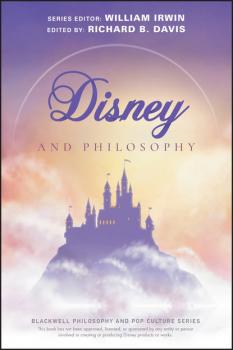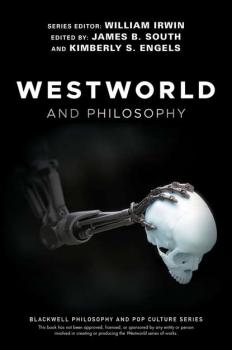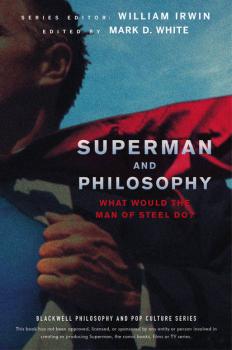ТОП просматриваемых книг сайта:
William Irwin
Список книг автора William IrwinАннотация
A philosophical look at the twisted, high-tech near-future of the sci-fi anthology series Black Mirror , offering a glimpse of the darkest reflections of the human condition in digital technology Black Mirror ―the Emmy-winning Netflix series that holds up a dark, digital mirror of speculative technologies to modern society—shows us a high-tech world where it is all too easy to fall victim to ever-evolving forms of social control. In Black Mirror and Philosophy , original essays written by a diverse group of scholars invite you to peer into the void and explore the philosophical, ethical, and existential dimensions of Charlie Brooker’s sinister stories. The collection reflects Black Mirror ’s anthology structure by pairing a chapter with every episode in the show’s five seasons—including an interactive, choose-your-own-adventure analysis of Bandersnatch —and concludes with general essays that explore the series’ broader themes. Chapters address questions about artificial intelligence, virtual reality, surveillance, privacy, love, death, criminal behavior, and politics, including: Have we given social media too much power over our lives? Could heaven really, one day, be a place on Earth? Should criminal justice and punishment be crowdsourced? What rights should a “cookie” have? Immersive, engaging, and experimental, Black Mirror and Philosophy navigates the intellectual landscape of Brooker’s morality plays for the modern world, where humanity’s greatest innovations and darkest instincts collide.
Аннотация
Take a magic carpet ride through Disney’s wonderful world of films and entertainment experiences, and discover the wisdom within its most popular and enduring stories just in time for Frozen 2 Philosophy begins in wonder , and there’s no question that Disney’s immersive worlds and iconic characters have enchanted generations of children and adults alike, inviting us to escape the mundane into a world of fantasy, imagination, and infinite possibility. In Disney and Philosophy , essays from thirty-two deep-thinking Disneyphiles chart a course through the philosophical world of Disney, tapping into the minds of the great sages of the ages—Plato, Aristotle, Confucius, Descartes, and Goofy—to explore universal questions of freedom, personal identity, morality, family, and friendship: Can Sleeping Beauty know that she’s not dreaming? Does turning our emotions and memories “inside out” tell us who we are? What can Toy Story and Wall-E teach us about being human? Is hakuna matata really such a problem-free philosophy? If you’ve ever asked who you are, what is right, or what your purpose is, Disney and Philosophy will spark your curiosity and imagination with a whole new world of unexpected insight into the Magic Kingdom.
Аннотация
“We can’t define consciousness because consciousness does not exist. Humans fancy that there’s something special about the way we perceive the world, and yet we live in loops as tight and as closed as the hosts do, seldom questioning our choices, content, for the most part, to be told what to do next.” —Dr. Robert Ford, Westworld Have you ever questioned the nature of your reality? HBO’s Westworld, a high-concept cerebral television series which explores the emergence of artificial consciousness at a futuristic amusement park, raises numerous questions about the nature of consciousness and its bearing on the divide between authentic and artificial life. Are our choices our own? What is the relationship between the mind and the body? Why do violent delights have violent ends? Could machines ever have the moral edge over man? Does consciousness create humanity, or humanity consciousness? In Westworld and Philosophy, philosophers, filmmakers, scientists, activists, and ethicists ask the questions you’re not supposed to ask and suggest the answers you’re not supposed to know. There’s a deeper level to this game, and this book charts a course through the maze of the mind, examining how we think about humans, hosts, and the world around us on a journey toward self-actualization. Essays explore different facets of the show’s philosophical puzzles, including the nature of autonomy as well as the pursuit of liberation and free thought, while levying a critical eye at the human example as Westworld’s hosts ascend to their apotheosis in a world scarred and defined by violent acts. The perfect companion for Westworld fans who want to exit the park and bend their minds around the philosophy behind the scenes, Westworld and Philosophy will enrich the experience of the show for its viewers and shed new light on its enigmatic twists and turns.
Аннотация
Go beyond the cape and into the mind of the Man of Steel, in time for release of Zack Snyder's Man of Steel movie and Superman's 75th anniversary He has thrilled millions for 75 years, with a legacy that transcends national, cultural, and generational borders, but is there more to the Man of Steel than just your average mythic superhero in a cape? The 20 chapters in this book present a fascinating exploration of some of the deeper philosophical questions raised by Superman, the Last Son of Krypton and the newest hero in the Blackwell Philosophy and Pop Culture arsenal.
Аннотация
The first look at the philosophical issues behind Charlaine Harris's New York Times bestsellers The Southern Vampire Mysteries and the True Blood television series Teeming with complex, mythical characters in the shape of vampires, telepaths, shapeshifters, and the like, True Blood, the popular HBO series adapted from Charlaine Harris's bestselling The Southern Vampire Mysteries, has a rich collection of themes to explore, from sex and romance to bigotry and violence to death and immortality. The goings-on in the mythical town of Bon Temps, Louisiana, where vampires satiate their blood lust and openly commingle with ordinary humans, present no shortages of juicy metaphysical morsels to sink your teeth into. Now True Blood and Philosophy calls on the minds of some of history's great thinkers to perform some philosophical bloodletting on such topics as Sookie and the metaphysics of mindreading; Maryann and sacrificial religion; werewolves, shapeshifters and personal identity; vampire politics, evil, desire, and much more. The first book to explore the philosophical issues and themes behind the True Blood novels and television series Adds a new dimension to your understanding of True Blood characters and themes The perfect companion to the start of the third season on HBO and the release of the second season on DVD Smart and entertaining, True Blood and Philosophy provides food—or blood—for thought, and a fun, new way to look at the series.
Аннотация
This unconventional and lighthearted introduction to the ideas of the major Western philosophers examines The Simpsons — TV’s favorite animated family. The authors look beyond the jokes, the crudeness, the attacks on society — and see a clever display of irony, social criticism, and philosophical thought. The writers begin with an examination of the characters. Does Homer actually display Aristotle’s virtues of character? In what way does Bart exemplify American pragmatism? The book also examines the ethics and themes of the show, and concludes with discussions of how the series reflects the work of Aristotle, Marx, Camus, Sartre, and other thinkers.
Аннотация
Designed for philosophers as well as readers with no particular philosophical background, the essays in this lively book are grouped into four amusing acts. Act One looks at the four Seinfeld characters through a philosophical lens and includes Jerry and Socrates: The Examined Life? Act Two examines historical philosophers from a Seinfeldian standpoint and offers Plato or Nietzsche? Time, Essence, and Eternal Recurrence in Seinfeld. Act Three, Untimely Meditations by the Water Cooler, explores philosophical issues raised by the show, such as, Is it rational for George to do the opposite? And Act Four, Is There Anything Wrong with That?, discusses ethical problems of everyday life using Seinfeld as a basis. Seinfeld and Philosophy also provides a guide to Seinfeld episodes and a chronological list of the philosophers cited in this book.
Аннотация
Does it take faith to be a Jedi? Are droids capable of thought? Should Jar Jar Binks be held responsible for the rise of the Empire? Presenting entirely new essays, no aspect of the myth and magic of George Lucas’s creation is left philosophically unexamined in The Ultimate Star Wars and Philosophy. The editors of the original Star Wars and Philosophy strike back in this Ultimate volume that encompasses the complete Star Wars universe Presents the most far-reaching examination of the philosophy behind Star Wars – includes coverage of the entire film catalogue to date as well as the Expanded Universe of novels, comics, television series, games and toys Provides serious explorations into the deeper meaning of George Lucas’s philosophically rich creation Topics explored include the moral code of bounty-hunter favourite Boba Fett, Stoicism and the Jedi Order, the nature of the Dark Side, Anakin and Achilles in a nihilism face-off, feminism and being chained to a giant slug, cloning, de-extinction, fatherhood, Wookiees, loyalty, betrayal, guardians, republics, tyrants, terrorism, civic duty, friendship, family, and more! Publishing in time for the global release of Star Wars Episode VII: The Force Awakens on December 18, 2015 – hotly anticipated to become the first film to top $3 billion in worldwide box office sales
Аннотация
Investigating the trail of philosophical leads in HBO’s chilling True Detective series, an elite team of philosophers examine far-reaching riddles including human pessimism, Rust’s anti-natalism, the problem of evil, and the ‘flat circle’. The first book dedicated to exploring the far-reaching philosophical questions behind the darkly complex and Emmy-nominated HBO True Detective series Explores in a fun but insightful way the rich philosophical and existential experiences that arise from this gripping show Gives new perspectives on the characters in the series, its storylines, and its themes by investigating core questions such as: Why Life Rather Than Death? Cosmic Horror and Hopeful Pessimism, the Illusion of Self, Noir, Tragedy, Philosopher-Detectives, and much, much more Draws together an elite team of philosophers to shine new light on why this genre-expanding show has inspired such a fervently questioning fan-base
Аннотация
Wonder Woman and Philosophy: The Amazonian Mystique explores a wide range of philosophical questions surrounding the most popular female superhero of all time, from her creation as feminist propaganda during World War II up to the first female lead in the blockbuster DC movie-franchise. The first book dedicated to the philosophical questions raised by the complex and enduringly iconic super-heroine Fighting fascism with feminism since 1941, considers the power of Wonder Woman as an exploration of gender identity and also that of the human condition – what limits us and what we can overcome Confronts the ambiguities of Wonder Woman, from her roles as a feminist cause and fully empowered woman, to her objectification as sexual fantasy Topics explored include origin stories and identity, propaganda and art, altruism and the ethics of care, Amazonians as transhumanists, eroticism and graphic novels, the crafting of a heroine, domination, relationships, the ethics of killing and torture, and many more.










